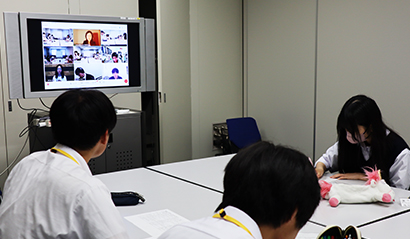JIU Josai International University

Implementation of a high school-university collaboration program with Naruto High School with the themes of "multicultural coexistence" and "health care basics"
Regional cooperation
2023.06.29

A high school student taking notes while interacting with Associate Professor Yuka Omori, Department of Department of Inter-cultural Studies Faculty of International Humanities.
On June 16, 3rd year students from Chiba Prefectural Naruto High School (Sammu City) took part in a high school-university collaboration program at Chiba Togane Campus. Based on the comprehensive partnership agreement concluded with the school, it was implemented as part of career development, and aimed at students aiming to become pharmacists, physical therapists, and nurses, as well as "multicultural coexistence" to learn about international society and cultures of other countries. A total of 33 people participated in the two themes of "Healthcare Basics".
"Health Care Fundamentals" was taught by Assistant Professor Taizan Fukaya of the Department Department of Physical Therapy Faculty of Social Work Studies. At the beginning, I explained the role of the physical therapist while giving a specific example in rehabilitation. In addition, Assistant Professor Fukaya explained the importance of developing team medical care with doctors, nurses, pharmacists, etc., saying, "It is important for physical therapists to collaborate with other professionals." We introduced the wide range of occupations where physiotherapists are active, such as government agencies and companies.
In "multicultural coexistence" Department of Inter-cultural Studies will remotely connect our university with the overseas partner school, University of California, Riverside (USA), and support Faculty of International Humanities students from Japan. was in charge. Four students majoring in Japanese at Riverside also participated and answered questions from the students. Japanese animation was used as a teaching material, and the scripts in Japanese and English were compared. The students asked a series of questions about the differences in expressions, such as, "The expression is different between dubbing and subtitling, but how do you think about changing it?" I was. While mixing Japanese and English, the students politely answered the questions, saying, "Subtitles are a direct way of speaking, while dubbing is a way of speaking that blends into the story." Ta. One of the students who participated said happily, "It was fun to ask questions in English, and I was able to learn about cultural differences."
The high school-university collaboration program with the school is scheduled to run until November.